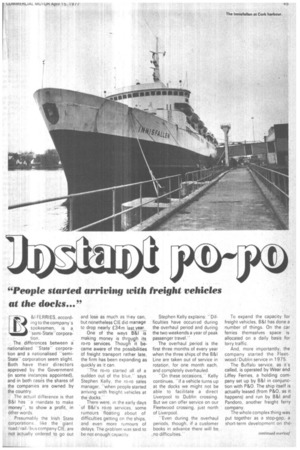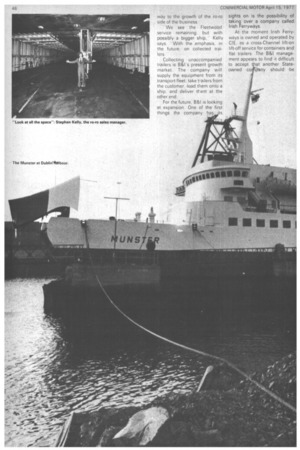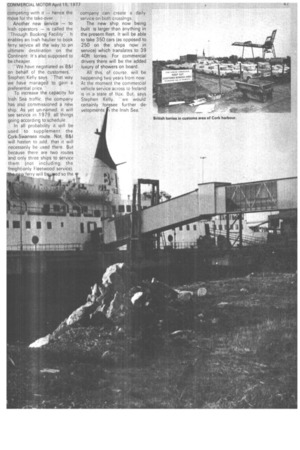"People started arriving with freight vehicles at the docks..."
Page 47

Page 48

Page 49

If you've noticed an error in this article please click here to report it so we can fix it.
bi li 8irilg Ft ED Rt hRel Ec oS ni, apcac no yr d; spokesmen, ' is a, ""semi-State"corpora
tion. .
The differences between a nationalised "State" corporation and a nationalised ''semiState"' corporation seem slight. Both have their directors approved by the Government (in some instances appointed), and in both cases the shares of the companies are owned by the country.
The actual difference is that B&I has -a mandate to make money", to show a profit, in other words
Presumably the Irish State corporations.. like the giant road/ rail / bus company CIE, are not actually ordered to go out and lose as much as they can, but nonetheless CIE did manage to drop nearly £34m last..year.
One of " the ways B&I is .making money is through its ro-ro services. Though it became aware of the possibilities of freight transport rather late, the firm has been expanding as quickly as it can.
".The ro-ro started all of a sudden out of the blue,says Stephen Kelly, the ro-ro sales manager, "when people started arriving with freight vehicles at the docks."'
There were, in the early days of B&I's ro-ro services, some rumours floating about of difficulties getting on the ships, and even more rumours of delays. The problem was said to be not enough capacity. Stephen Kelly explains: "Difficulties have occuried during the overhaul period and during the two weekends a year of peak passenger travel."' The overhaul .period is the first three months of every year when the three ships of the B&I Line are taken out of service in rotation, for one month each, and completely overhauled.
• "On these occasions," Kelly • continues, "if a vehicle turns up at the docks we might not be able to facilitate a direct Liverpool to Dublin crossing. But we can offer service on our Fleetwood crossing, just north of Liverpool.
"Even during the overhaul periods, though, if a customer hooks in advance there will be‘ _no difficulties."'
To expand the capacity for freight vehicles, B&I has done a number of things. On the car ferries themselves space is allocated on a daily basis for lorry traffic.
And, more importantly, the company started the Fleetwood/Dublin service in 1975.
The Buffalo service, as it's called, is operated by Wear and Liffey Ferries, a holding company set up by B&I in conjunction with P&O. The ship itself is actually leased (from P&O, as it happens) and run by B&I. and Pandora, another freight ferry company.
The whole complex thing was put together as a stop-gap, a short-term development on the way to the growth of the ro-ro side of the business: We see the. Fleetwood service remaining, but with possibly a bigger ship,'" Kelly says. "With the .emphasis, in the future, on collected trailers
Collecting unaccompanied trailers is B&l's present growth market. The company will supply, the equipment from AS transport fleet, take trailers from the customer, -load them onto a ship, and deliver them at the other end.
For the future, B&I is looking at expansion. One of the first things the company has "ts sights on is the possibility of taking over a company called Irish Ferryways.
At the moment Irish Ferry ways is owned and operated by CIE, as a cross-Channel lift-on lift-off service for containers and flat trailers The B&I management appears to find it difficult to accept t at another Stateowned no'any should be competing with it -hence the move for the take-over.
Another new Service — to Irish operators' -is called the "Through Booking Facility". It enables an Irish haulier to book ferry service all the way to an ultimate destination on the Continent It's also supposed to be cheaper.
"We have negotiated as B&I on behalf of the customers," Stephen Kelly says "That way we have managed to gain a preferential price."' To increase the capacity for Irish Sea traffic, the company has also commissioned a new ship. As yet un-named, it will see service in 1979, all things going according to schedule.
In all probability it will be used to supplement the Cork-Swansea route. Not. B&I will hasten to add, that ri will necessarily be used there. But because there are two routes and only three ships to service them (not including the freight-only Fleetwood service), erry will b ed so the company can create a daily service on both crossings.
The new ship now being built is larger than anything in the present fleet. It will be able to take 350 cars (as opposed to 250 on the ships now in service) which translates to 39 40ft lorries. For commercial drivers there will be the added luxury of showers on board.
All this, of course, will be happening tvvo years from now. At the moment the commercial vehicle service across to Ireland is in a state of flOx. But: say's Stephen Kelly, -we would certainly foresee further de
velopments the Irish Sea.




























































































